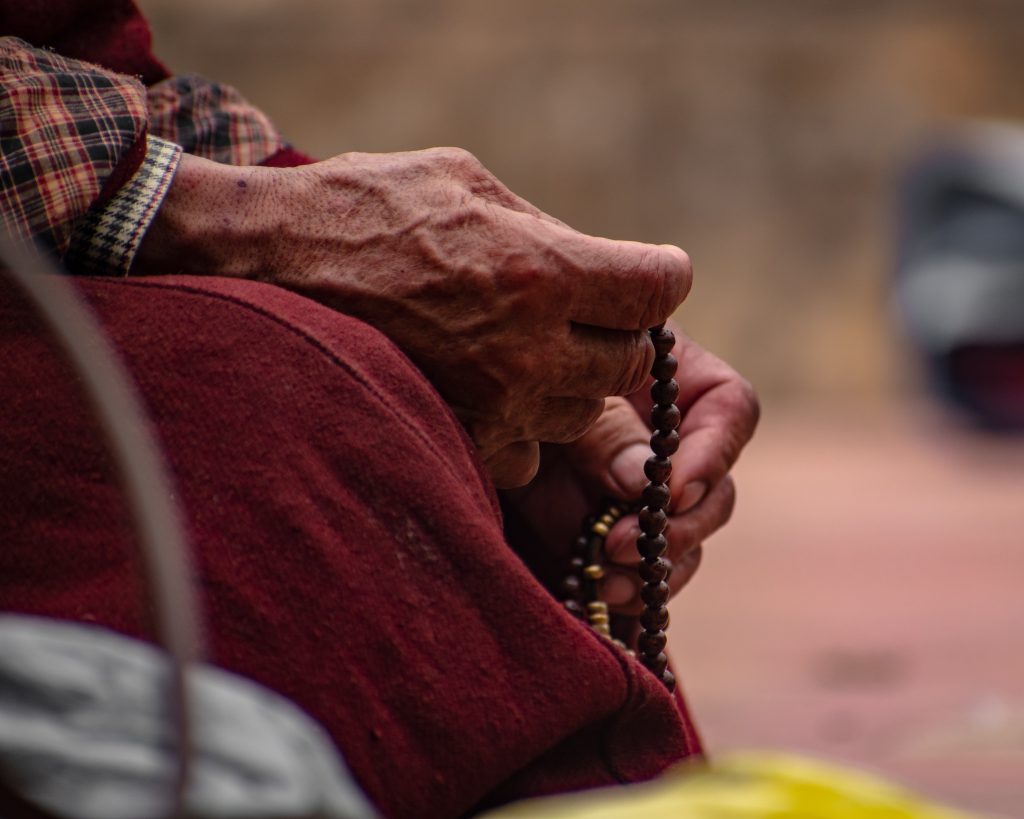Each of us seeks a place where we are perfectly comfortable and happy, yet our bodies and this world have so many miseries built into them. This article is edited from a lecture given by Jagad Guru and gives important insight into how to transcend the suffering of this world.
Ancient Wisdom
The Bhagavad-gita states:
The wise, engaged in devotional service, take refuge in the Lord, and free themselves from the cycle of birth and death by renouncing the fruits of action in the material world. In this way they can attain that state beyond all miseries.
—Bhagavad-gita 2.51
In his purport, Srila Bhaktivedanta Swami Prabhupad comments: “The liberated living entities seek that place where there are no material miseries.”
Everybody is seeking a place where there are no material miseries. But wherever you go in the world there are material miseries. The body alone comes with its material miseries. Thus, the Chinese philosopher Lao Tzu made the point that we should accept suffering as inherent. Why? Because as long as the body exists, there’s going to be misery. It’s inherent in it. So it’s natural that you’ll experience suffering. You should accept that suffering is the intrinsic nature of the material body as well of as this material world.
Surprise! Surprise!
Yet although suffering is natural in this world, people get surprised time and time again when they encounter it. “Oh, no, someone died! Oh, no, a relative has cancer! Oh, no, I hurt my toe! Oh, no, I got a toothache!” They get surprised when they watch the evening news. “Oh, no, a bunch of people died! Why can’t someone stop this? Why don’t the politicians and powers that be just put an end to this suffering?” Even in just coming home, people express surprise. “What? The kids haven’t washed the dishes! My wife hasn’t cooked dinner!” It’s a greater shock for them to hear that the husband has lost his job! People react, “Oh, no, trouble again at the office!” Really? Surprise! Surprise! But this is the reality of life. Some people like to put a spin on it by saying, “Suffering is a part of life.”
People get so exasperated when they encounter miseries. Lao Tzu’s point is that a large part of people’s exasperation is this non-acceptance of reality—we don’t accept the nature of where we are. People want to think, “Everything’s under control. Everything’s working right. Everything’s fine.”
We have to recognize that this material world is a place of misery. Since we have a material body, we should not be thinking that we’re going to be able to find a spot where there’s no misery because the material body brings misery with it. For example, we’ve got teeth. Built into that are toothaches, cavities, etc. And we’ve got stomachs. Sooner or later, we’re going to get a stomachache. We’ve got so many body parts that sooner or later will malfunction and cause us suffering.

Beyond All Misery
The Supreme Person says that a person “can attain that state beyond all miseries.” This means that a person can achieve the spiritual realm—the world without any material bodies. In other words, the spiritualist who engages in devotional service to the Lord attains freedom from the cycle of birth and death. He is freed from this repetition of taking on one body with built-in misery after another.
Actually, a person who is satisfied in the devotional service of the Supreme Lord is not concerned about the misery of the material body. He knows that this misery of the body will be there. And if the Supreme Lord wants him to be in the material world, which is by nature full of suffering, then he will accept that suffering as his austerity or sacrifice. This is pure devotional service.
Dangers And Delusions
The Srimad Bhagavatam states:
For one who has accepted the boat of the lotus feet of the Lord, who is the shelter of the cosmic manifestation and is famous as Mukunda or the giver of mukti [liberation], the ocean of the material world is like the water contained in a calf’s footprint. Param padam, or the place where there are no material miseries, or Vaikuntha, is his goal, not the place where there is danger in every step of life.
—Srimad Bhagavatam 10.14.58
There is danger in every step of life. The problem with the material world is not so much the misery that comes with it but rather the delusion that a person is in that he is home.
We’re always seeking “home.” We seek a place where there won’t be any misery, where the rug won’t be pulled out from beneath us, where the landlord won’t kick us out, where our bank accounts won’t fall apart, where we won’t be too hot or too cold. We’re always seeking a perfect place where we can make a home and it will be good forever. We want to feel “Now things are just right. I have a child. I love my child. I’ve got my nice husband. I’ve got my nice house. Everything’s just like I want it.” But it doesn’t stay that way. Nothing stays the same in the material world. This happiness is a passing phenomenon. This world that you are in is a passing phenomenon. It’s not secure. It’s not eternal. It’s here today but it will be gone tomorrow.

So we have to recognize that the greatest danger of this material world is that we can be lulled into the illusion that “I am home. This is my happiness. This is my life.”
Who Is To Blame?
Even people who are trying to practice spiritual life can be lulled if they are not careful. They may be engaging in unfavorable activities, cultivating material attachments, or even being neglectful and not fully conscious of what they are doing. Thus, their desire to render service to the Lord becomes eclipsed by material desires. In other words, they choose to serve the illusory material energy (known as maya) over service to the Supreme Person. Before they know it, they are gradually lulled into this feeling that “This is my home. I have my house, my job, a nice income. Everything is nice in life.” Then they get surprised a few years down the road when the rug is pulled out from beneath them. And they blame the Supreme: “What are You doing to my life?”
We forget that this material body and the relationships that come with it are temporary and full of misery. So sometimes when we get a shock we get angry at the Supreme Person: “Why are You making my life difficult?” But actually, we’ve set ourselves up for that suffering. We’ve set ourselves up for that fall. And we’ve done that by being careless. We’ve taken our relationship with the Supreme Person lightly and made it a secondary thing, a side thing, rather than the core. In other words, we have other relationships that have become as important or more important than our relationship with the Supreme.
So there is a danger that we get lulled into this illusion that we are home. But this material world can never be the home of the spirit soul because it is temporary and we are eternal. And whenever you take the eternal soul and place her in a temporary situation, then there’s going to be this contradiction or conflict between the eternal and the transitory.
We are eternal. We want an eternal home so when we try to make an eternal home in a temporary situation, then we must inevitably experience the suffering that comes from that when we get ripped away.
Danger In Every Step
There is danger in every step of life. Just today one of my dear friends was out in the water surfing and along came a shark, just cruising some thirty feet away. And my friend was way out in the ocean with almost no one else around. Before the shark came along, my friend may have been thinking, “My biggest problem today is that there are no waves. There are a few, but they are messy and no good for surfing.” At some other time, he may have also thought, “The biggest problem in my life is that there are too many people in the water. They’re all making it hard to get a wave.” But when the shark appeared, he didn’t think about the waves anymore. In fact, he wondered, “Too bad there aren’t more people out here. Where is everyone? Yesterday there were a hundred people out here. Today there are just three of us for that shark to choose from!”

So the shark cruised, by taking his time. Death isn’t afraid of anyone. Then the shark disappeared under the water after sixty seconds of cruising by. I asked my friend, “So what did you do after it disappeared?” He replied, “Well, I immediately went out to the boat.” Since they were far out in a surf place, he paddled to the boat. I asked, “To the boat? You paddled over to where the shark was?” He answered, “Oh, yeah, it was gone.” So the shark just goes under the water and we think we can just go out now because it has disappeared. We figure, “It’s gone. It’s all clear. It’s all okay now.” We don’t consider that danger is lurking there at every step.
For example, a husband and wife may be driving home from the beach, arguing about what they’re going to have for dinner tonight: “I want this.” “No, I want this!” Suddenly they have a car accident. That wasn’t in their plan. The fact is, there’s danger at every step, and at any moment we may have to leave this world.
The Solution
The point of the Bhagavad-gita is that we must understand that there’s danger, that material suffering is an intrinsic part of this material body and that we should do that which enables us to transcend or be liberated from this dangerous situation of birth and death. That solution is called devotional service to the Supreme Lord.
When my love for the Supreme is there, that transports me into the spiritual world—the world where there is no birth and death. Automatically at the time of death I will go to the Supreme Lord because that’s where my love is. Where my love is, that’s who I will think of at the time of death.
Many people like to think of themselves as spiritual or religious people. But their love is on their dog, child, husband, or wife. And when they leave this world, they think of their loved one. But just thinking of my child, for example, will not transport me into the spiritual world. Rather, it transports me into the material dimension. I will remain in the world of birth and death.
Separation And Longing
Love for the Supreme Lord does not mean that I don’t love others. I can love my spouse, my children, and my friends. But that’s different from the longing we speak of. When we speak about love for the Supreme, we’re speaking about a longing that transcends and is infinitely greater than our longing for anyone else.
I got a letter recently from a person in prison. Obviously, he is very unhappy that he is in prison. He expressed how much he is longing for his wife and children. Being in prison is like semi-death. You’re alive but you’re separated from the world, from all the things you’re attached to. You’re not allowed to live with your spouse, your family members, or your friends. You’re not allowed to eat where you want to eat. You’re not allowed to do what you want to do. That’s the punishment. So you start to long for that which you don’t have and for those to whom you are attached. So I told him, “This is good for you because it gives you the opportunity, before you have to actually leave this world, to see where your attachments really are and who you’re attached to more than anyone else.” I asked him, “Are you longing for the Supreme Person right now? Are you longing for the opportunity to be able to hear and chant His names, to meditate upon Him, to think of Him, or to read His words or hear of His pastimes? Is that what you are longing for? No, because after all, you can still do that even though you’re in prison. So what or who are you longing for? You get to realize who you’re attached to more than anyone else.”

This person gets to practice death. He gets to practice leaving this world. In reality, that’s what old age is arranged for. Most people have bodies that will get old before experiencing death. That’s nature’s arrangement, and it’s a natural progression of breaking our attachments.
The Vedic System
The Vedic system is one in which life has different divisions according to age or time. Childhood, or the first five years, is essentially total kid time. Pretty much the kids can do whatever they want. But then after five years old, they start to learn some discipline and go to school. The following years are devoted to education and schooling. Then, after being educated to a certain extent, they consider whether they want to be married. If they do, they have what’s called householder life. In other words, they marry and have children.
After twenty or thirty years, there is another stage. The parents have raised the children, who now want to have a life of their own. The children develop attachments of their own and want a scene where the parents are not telling them what to do all the time. So the kids leave home. And what happens? The parents experience separation. It’s called the “empty nest syndrome”—here’s mom and dad after the kids have left. This is like death because they are being separated from those who they are attached to. They experience semi-death here. They learn about life in this way. If they are simultaneously being educated and gaining wisdom, then they experience a life that is full of knowledge and understanding. Then, at that point, sex life is finished. The stage of making children is over. Now it’s time for them to simply engage fully in the devotional service of the Lord. They start to focus on where they’re going from here. They start to become aware of their physical mortality.
Up to the age of around forty, people aren’t fully aware of their physical mortality. They think, “I’m going to live forever.” When they reach forty, they start seeing the other side: “Hmm, it can end.” So now is the time to prepare. After all, if you know you are leaving, shouldn’t you prepare for where you are going to?
In the Vedic system, you start to make serious preparation. The kids are gone. You have more time now. You don’t have all those duties of having to cook for them and take care of them. So don’t suffer like some people do in the West: “Oh, no, my kids are gone! I can’t take care of them anymore. I don’t have any purpose in life.” Instead, take that time and use it to cultivate your relationship with the Supreme. Cultivate your love for the Supreme Person and focus on your relationship with Him. In the Vedic system, that time is a very special time. From that point forward, you should be focusing on that relationship more and more. You don’t need to go out and make a lot of money anymore to support the family. You should already have what you need. Now you should live on what you have and live simply.
A Practical Example
I recently read about this one industrialist in India who was worth billions of dollars. He had so much wealth, but he was raised in such a way that he understood the real purpose of life. At about sixty years of age, he was running so many companies and was very active in the political arena. He had all this political power as well as political opponents. After all, in politics, you have your friends and your enemies. In any case, he then knew, “Now is the time.” So he left all of that behind and simply spent his life going to places of worship and places of pilgrimage. He didn’t keep any money but went around begging, not because he was afraid of starving or because he was a poor person, but because now he was going to live that phase of his life where he was totally dependent on the Supreme. He was not going to depend anymore on his cleverness, intelligence, abilities, businesses, and so on. He was just going to depend on the Supreme Lord. He had the faith that “The Supreme Lord will take care of me, but I have to act on that.” And the way that he acted on that was that he simply followed the Vedic process of begging for his necessities. In other words, if he needed to eat something, then he would go to the householders. And just like he used to give people rice when they came to him when he was a householder, now they put some rice in his bowl.
What’s interesting is that naturally, he came across all kinds of people. After all, you don’t know who you’re going to come across when you knock on that door. Will they be friendly? Will they be nice? Will they shoo you away like a dog? Will they throw something at you? This is the challenge you’re faced with when you walk up to someone’s door. And there were times when he would go to the homes of former political opponents. Now that’s embarrassing. There’s nothing more humiliating or humbling. And that’s the purpose of going from door to door asking for rice. The reason why monks do this is not because they’re hungry or because they don’t have any means. That’s not the purpose from their point of view. Their purpose is humility. Nothing humbles you more than having to go and knock on somebody’s door and extend your little bowl and ask them if they have some rice. You’re a beggar.
So here was this guy who was a multi-multimillionaire and he humbled himself. Previously, he was riding in all the Rolls Royces. Now he was walking with his little bowl. Before, he was in this position where he was higher than everybody, so much so that when he walked into a room, everybody gave way and paid him respect. People came to him and begged from him all day long. It’s a position that makes people feel powerful, and this is a reason some people like being philanthropists. They like to be rich because they like to give to poor people. It makes them feel big, strong, and powerful: “Oh, here’s a poor person. Let me give him an apple.” So this person was sought out by so many people. Even the politicians were coming and begging from him. The prime ministers were beseeching, “Please support me. Give me money for these elections.” Now this time, he was the one begging. He didn’t lose it in the stock market. It’s just the Vedic system. The idea is, “Now I must focus on my relationship with the Supreme Lord because I’m going to leave this world soon.”

Cultivate That Longing
Our point is this: We should not wait to cultivate our love for the Supreme Person. In the Vedic system, our love for the Supreme is supposed to be cultivated from the time we are born. We should be developing an attachment to the Supreme Lord so that even though we have our families, our main relationship is with the Supreme Person. And family and friends should be connected to each other by dint of the fact that we all have a common interest—our common Friend, our common Father, our common Protector, the Supreme Lord. We worship Him together. Individually and collectively, we focus our attention upon our relationship with the Supreme Lord. In this way, our love for Him is developed. Our longing for Him increases, and who you long for is what you achieve when you leave this world. So you must cultivate that longing for the Supreme Lord.
We are all in prison, in a sense, in this material world. Some of us have nicer cells than others. But while we’re here, we need to be cultivating our longing for the Supreme Lord so that we will leave this prison sooner or later and go to Him.
Thank you very much.


 Kirtan
Kirtan Meditation
Meditation